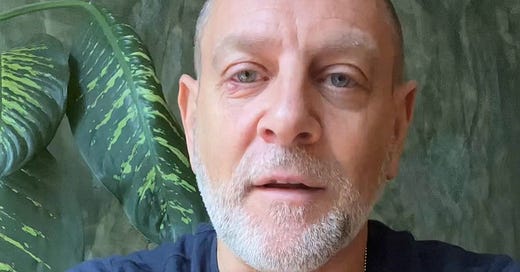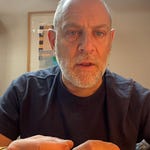Playback speed
×
Share post
Share post at current time
Share from 0:00
0:00
/
0:00
Transcript
Less Alone, through the Valleys.
Weekly Recap Vid of Below the Bible Belt
May 10, 2024
“Forces beyond your control can take away everything you possess except one thing, your freedom to choose how you will respond to the situation.”
This is Victor Frankl’s famous quote from his book ‘Man in Search of Meaning’, which feels so helpful during these dark days of violence and hurting. We just marked Holocaust Memorial Day, and these words of Frankl’s were forged during his survival in the camps. We are ahead of the week on which we mark both the birth of Israel and the struggles of Palestine. How do we respond with love, compassion, responsibility, grief and goodwill, pride and hope- to all?
How do we respond? And how do we respond when suffering of all sorts are upon us? Medical, mental, personal, political, illness and death, cruelty and callousness, loneliness and isolation? We all walk through these valleys and we all need a helping hand. But it’s not always there, so what will help us find strength within?
That’s where words like those found in the psalms can be essential, life saving. Whether you have faith in God as your shepard or the universe that wants all to thrive, or an inner self that is resilient even through tough times -- there is poetry to remind us, to cheer us on when needed -- to make sure we know we are not alone and are interconnected, and have agency to make it through.
On our Below the Bible Belt Journey, making our way through the Book of PSLAMS, we just read the famous one of all - 23. That’s the one that begins with - God is My Shepard. It has more musical renditions that most other poems in the world and is often quoted in somber occasions, often in funerals.
And though it does touch upon the reality of death, it really is about how we walk through the ups and downs of life.
Here’s a famous line that I want to focus on:
גַּ֤ם כִּֽי־אֵלֵ֨ךְ בְּגֵ֪יא צַלְמָ֡וֶת לֹא־אִ֘ירָ֤א רָ֗ע כִּי־אַתָּ֥ה עִמָּדִ֑י שִׁבְטְךָ֥ וּ֝מִשְׁעַנְתֶּ֗ךָ הֵ֣מָּה יְנַֽחֲמֻֽנִי׃
Though I walk through a valley of deepest darkness,I fear no harm, for You are with me; Your rod and Your staff—they comfort me.
It’s often translated as the ‘valley of the shadow of death’ which is sort of the original Hebrew but either way it’s about how we handle the tough times. How do we feel less alone in our pain? How do we make sense of suffering and hardships - is there a purpose? Can it lead us, through the contractions, to expansion and growth?
There is a rabbinic teaching about this verse that is quite radical. In the Midrash on the Song of Songs, Rabbi Rebuen quotes a verse from the prophet Isaiah and links it to this verse with a powerful theological statement:
“The prophet said: “for God will be the judge through fire” (Isaiah 66:16)
Rabbi Reuven said: Had this matter not been written, it would have been impossible to say it: As it were, Shofet is not written here, but rather nishpat. Not God as the judge through fire, but God as judged by fire, alongside the people.
This is what David said, inspired by the Divine Spirit: “Even if I were to walk through the valley of the shadow of death, I will fear no evil, for You are with me.”
In other words, even though we feel alone, inside the furnace of suffering, we are not.
Whatever the divine is, it is with us, in exile, in war, in the hospital and home, alone. There is solidarity of suffering that means that the divine is not remote, beyond, our father in heaven, but immanent, here, in the present, mother earth, body and soul.
This is faith, and it’s a choice and when things go badly it may be helpful to have poetry and psalms at our disposable and some sense of being part of something bigger that may be mysterious but when push comes to shove helps us feel connected to the whole.
It is, as always, a work in process, and we have many more psalms to go through as we ask big questions about what this book of poems is about for our lives.
May mothers’ day bring blessing, and may the days ahead in Israel and Gaza. Palestine, and everywhere bring better news, healing and consolation, interdependence, pride, and peace.
Thank you for joining me below the bible belt.
Shabbat Shalom.
Recent Posts












Share this post